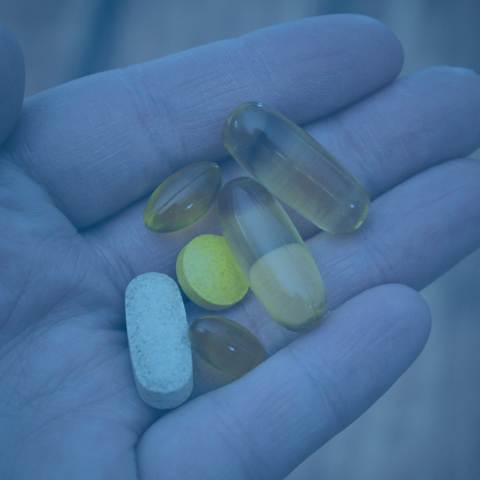Ever wondered why vitamin B3 shows up in almost every “natural T-booster” on the market [1]? Many wellness products link niacin to higher testosterone. But does science back the idea that niacin can turbocharge testosterone production, or is it just another myth? To answer this, we need to explore what niacin does in the body and examine the latest evidence from research [2-6].
Vitamin B3 or Niacin’s Role in the Body and Why It’s Hyped as a “T-Booster”
Vitamin B3, commonly known as niacin, is an essential nutrient that helps the body convert food into energy. It’s a building block of coenzymes (NAD⁺/NADH and NADP⁺/NADPH) involved in hundreds of metabolic reactions, including those that produce cellular energy and repair DNA [6]. Most people get enough niacin through diet: the recommended daily amount is about 16 mg per day for adult men (and 14 mg for women) [6]. Niacin is found in foods like meat, fish, dairy, and whole grains, and severe deficiency (pellagra) is rare today [6]. So why do some believe extra niacin could boost testosterone?
One reason is marketing. Over-the-counter “testosterone booster” supplements often pack in B-vitamins, including B3, at mega-doses. In fact, a 2020 analysis in the World Journal of Men’s Health examined 50 popular “T-booster” products and found many contained huge amounts of vitamins: on average, 187.5% of the daily value for vitamin B3, sometimes even exceeding recommended limits [1]. The majority of these products claimed to raise testosterone or libido [1]. The implied logic is that because niacin is involved in energy metabolism (and testosterone production requires energy and healthy cells), more niacin might translate into more testosterone. Additionally, niacin’s known benefits for improving blood cholesterol and blood flow (it’s even been tested for erectile dysfunction) have contributed to a healthy image around men’s vitality [4]. However, “natural” or not, high-dose niacin is not automatically beneficial for testosterone, especially without solid evidence for a real effect.
What Science Says: Research on Niacin and Testosterone
Clinical research on niacin’s direct impact on testosterone is limited. To date, there are no large randomized controlled trials showing that taking vitamin B3 supplements will increase testosterone levels in otherwise healthy men [1-6]. That hasn’t stopped researchers from investigating smaller clues and related outcomes. Here’s what the evidence tells us:
Observational hints in humans
A 2022 study looked at women with polycystic ovary syndrome (PCOS), a condition often linked to hormonal imbalance, and found something interesting about vitamin B3: Those who consumed more niacin (along with vitamins B6 and C) showed differences in a marker called the free androgen index, which reflects how much active testosterone is circulating in the body. This pattern appeared mainly in women whose hormone levels were within the normal range, rather than in those with very high testosterone [3].
In simple terms, the study hinted that higher niacin intake might relate to subtle shifts in hormone activity. But it didn’t prove that niacin itself caused the change: people who eat more vitamin-rich foods often have other healthy habits that can also affect hormones. Still, the findings were enough to spark scientific curiosity about whether niacin plays a supporting role in keeping hormone levels balanced.
Niacin and prostate/testosterone link
A 2024 study of older men (using U.S. data) found that those consuming more niacin were also more likely to have an enlarged prostate, a condition called benign prostatic hyperplasia (BPH). Since the prostate responds strongly to male hormones like testosterone and its active form, DHT, researchers wondered if higher niacin intake might slightly influence these hormone levels. They pointed out that niacin has been shown in animal studies to support testicular function and speculated that this could explain the pattern seen in humans [2]. Still, the study was observational, meaning it can’t prove cause and effect. Men who eat more niacin-rich foods may also differ in other ways, such as diet or body weight. The finding highlights the need for more research into niacin’s hormonal effects.
Controlled trials in humans
So far, no randomized trials have tested whether niacin raises testosterone in men [1]. One 2011 clinical study found that taking a higher dose of niacin (about 1,500 mg a day) helped improve erectile function in men with high cholesterol, although the benefit came from better blood flow, not hormonal changes [4]. The researchers reported no increase in testosterone. In short, better sexual performance doesn’t necessarily mean higher hormone levels [1,5,6].
Animal studies provide clues
With limited human data, scientists have turned to animal models to explore niacin’s hormonal effects. In rats, very high doses of vitamin B3 increased testosterone and improved testicular health, while in diabetic or stressed animals, niacin helped protect testicular tissue and prevent hormone decline [5]. These results suggest niacin may support hormone balance under certain conditions, possibly through antioxidant and metabolic effects. However, the doses used were far higher than those safe for humans, so these findings can’t be directly applied to people [5,6].
Implications for Wellness: Should You Take Niacin for Low Testosterone?
Considering the evidence, here’s what patients, wellness enthusiasts, and healthcare professionals should keep in mind:
Niacin is essential, but context matters
Vitamin B3 plays a key role in energy metabolism, blood flow, and cellular repair, all processes that indirectly support hormonal health. Most adults get enough from food [6]. When intake is already sufficient, taking large doses won’t necessarily boost hormone levels: the body’s endocrine system keeps testosterone tightly regulated [1,6].
That said, some supplements include niacin in higher or targeted doses. It’s worth checking how much niacin your supplement contains, and choosing formulations designed with precision rather than excess.
High-dose niacin can have side effects
Another reason to be cautious about experimenting with niacin megadoses is the side effect profile. Niacin is famously known to cause skin flushing, characterized by a prickly heat sensation and redness, especially at doses used for cholesterol treatment [6]. You can read more about this here.
Other potential side effects include dizziness, itching, upset stomach, and headaches [6]. Long-term high doses (in gram quantities) can even strain the liver and have been linked to liver damage and insulin resistance in some cases [6]. In the 2024 study of older men, there was a note that excessive niacin might worsen insulin control (possibly through effects on adipose tissue), which is a reminder that more is not necessarily better for metabolic health [2]. So, taking far above the recommended amount of B3 in hopes of gaining muscle or virility could backfire, causing more harm than good [2,6].
Beyond the Hype: A Smarter Way to Support Testosterone
When it comes to testosterone, there’s no single solution, and that’s actually good news. The same fundamentals that support your energy, mood, and focus also support your hormones: move your body regularly, prioritize sleep, manage stress, and eat nutrient-dense foods [1,6].
Micronutrients like niacin, vitamin D, and zinc all play their roles, but they work best as part of a balanced system, not as isolated fixes [2,4,6].
Niacin remains a fascinating piece of the puzzle: essential, versatile, and promising for metabolic and vascular health. While research hasn’t yet shown that additional B3 directly increases testosterone in healthy men, it continues to play an important role in the metabolic pathways that support overall vitality [1-6]. What we do know is that maintaining optimal niacin levels supports the bigger picture: your energy metabolism, blood flow, and cellular repair, all of which set the stage for better hormonal balance.
If you're interested in reading more about niacin, check out these blog articles:
References
- Clemesha CG, Thaker H, Samplaski MK. “Testosterone Boosting” supplements composition and claims are not supported by the academic literature. World J Mens Health. 2020;38(1):115-122. doi:10.5534/wjmh.190043
-
Feng X, Chen Y, Xia W, et al. Association between dietary niacin intake and benign prostatic hyperplasia: a population-based study from NHANES 2003–2008. J Health Popul Nutr. 2024;43:130. doi:10.1186/s41043-024-00624-1
-
Hestiantoro A, Astuti BPK, Joyo EO, et al. Vitamin B3 (niacin), B6, C, and iron intake are associated with the free androgen index, especially in normoandrogenic polycystic ovary syndrome. J Turk Ger Gynecol Assoc. 2022;23(3):130-136. doi:10.4274/JTGGA.GALENOS.2022.2022-2-1
-
Ng C-F, Lee C-P, Ho AL, Lee VWY. Effect of niacin on erectile function in men suffering erectile dysfunction and dyslipidemia. J Sex Med. 2011;8(10):2883-2893. doi:10.1111/j.1743-6109.2011.02414.x
-
Azimi Zangabad E, Shomali T, Roshangar L. Effects of pharmacological doses of niacin on subacute glucocorticoid-induced testicular damage in rats. Pharmacol Res Perspect. 2023;11(5):e01128. doi:10.1002/prp2.1128
-
Mayo Clinic. Niacin (Vitamin B-3) – Overview and Safety. Mayo Clinic website. Published March 21, 2025. Accessed October 10, 2025. Available from: https://www.mayoclinic.org






Comments (0)
There are no comments for this article. Be the first one to leave a message!